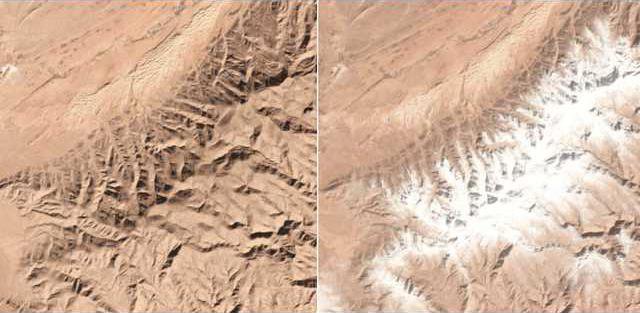Winter weather continues to barrel through the United States. Blizzards are expected across the nation. Heavy rain led to deadly mudslides in California.
Meanwhile, it snowed in Africa's Sahara Desert.
According to The Washington Post, a freak snow shower blanketed the Sahara, which is often known for its deadly, suffocating heat.
This is the second year in a row that the world's largest hot desert has seen snow.
To put rarity of the event in perspective, it's been nearly 40 years since the town of Ain Sefra, Algeria, had a snowstorm, The Washington Post reported. Snow previously fell in the area in 1979.
The recent run of cold weather on the U.S. East Coast was a factor in snow falling in the African desert, which often sees temperatures closer to 100 degrees during the day and 50 degrees at night.
Atmospheric scientist Mike Kaplan at the Desert Research Institute in Nevada explained to The Verge how normal weather patterns changed this year.
Normally, we will see cold weather in the north and warm air in the south. But, Kaplan said, sometimes "the buildup of warm air in the south and cold air in the north gets so extreme that the pattern will break down and weather patterns will flip.
This is why Alaskas has had a relatively mild winter compared to the East Coast, which saw temperatures as cold as Mars in the last two weeks.
Thats also why the Sahara Desert saw snow this week, The Verge reported.
It just doesnt happen every year, Kaplan said. A year seems like a long time to you and me, but its not a long time for the atmosphere.
According to The New York Times, icy weather often falls in Scandinavia and Europe. But the high-pressure systems (which move from west to east) this year in the U.S. pushed the cold weather to the south of Europe and Asia, leading to a snowstorm in the Sahara Desert.
The Sahara Desert is often too dry for snow. But Stefan Krpelin, a geologist at the University of Cologne in Germany, told The New York Times that the cold air in the South combined with heavy humidity created snow.
Kamel Sekkouri, who said he has seen snowfall in the Ain Sefra area five times, still marvels at it.
When you walk in the snowy dunes, you feel like you are in Mars or Uranus, he said.
Meanwhile, it snowed in Africa's Sahara Desert.
According to The Washington Post, a freak snow shower blanketed the Sahara, which is often known for its deadly, suffocating heat.
This is the second year in a row that the world's largest hot desert has seen snow.
To put rarity of the event in perspective, it's been nearly 40 years since the town of Ain Sefra, Algeria, had a snowstorm, The Washington Post reported. Snow previously fell in the area in 1979.
The recent run of cold weather on the U.S. East Coast was a factor in snow falling in the African desert, which often sees temperatures closer to 100 degrees during the day and 50 degrees at night.
Atmospheric scientist Mike Kaplan at the Desert Research Institute in Nevada explained to The Verge how normal weather patterns changed this year.
Normally, we will see cold weather in the north and warm air in the south. But, Kaplan said, sometimes "the buildup of warm air in the south and cold air in the north gets so extreme that the pattern will break down and weather patterns will flip.
This is why Alaskas has had a relatively mild winter compared to the East Coast, which saw temperatures as cold as Mars in the last two weeks.
Thats also why the Sahara Desert saw snow this week, The Verge reported.
It just doesnt happen every year, Kaplan said. A year seems like a long time to you and me, but its not a long time for the atmosphere.
According to The New York Times, icy weather often falls in Scandinavia and Europe. But the high-pressure systems (which move from west to east) this year in the U.S. pushed the cold weather to the south of Europe and Asia, leading to a snowstorm in the Sahara Desert.
The Sahara Desert is often too dry for snow. But Stefan Krpelin, a geologist at the University of Cologne in Germany, told The New York Times that the cold air in the South combined with heavy humidity created snow.
Kamel Sekkouri, who said he has seen snowfall in the Ain Sefra area five times, still marvels at it.
When you walk in the snowy dunes, you feel like you are in Mars or Uranus, he said.








